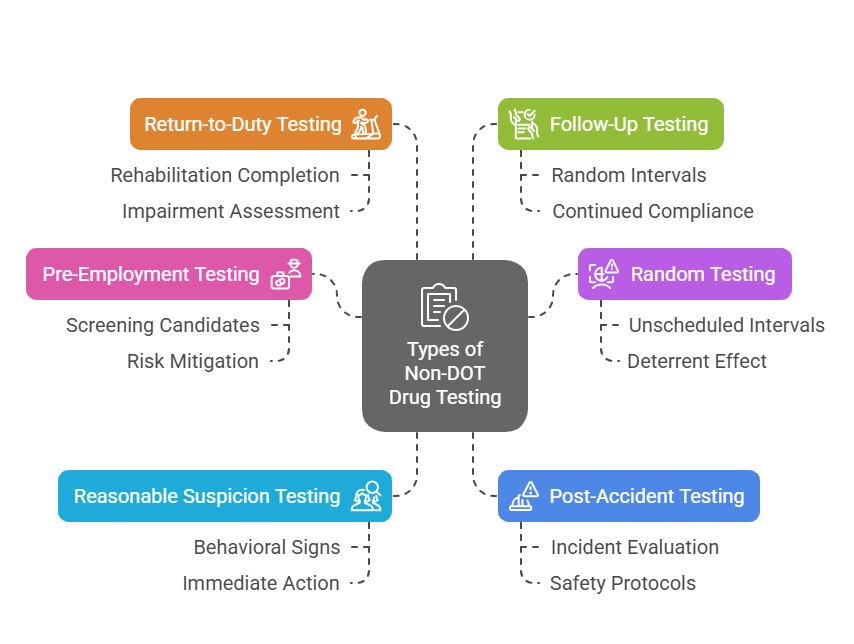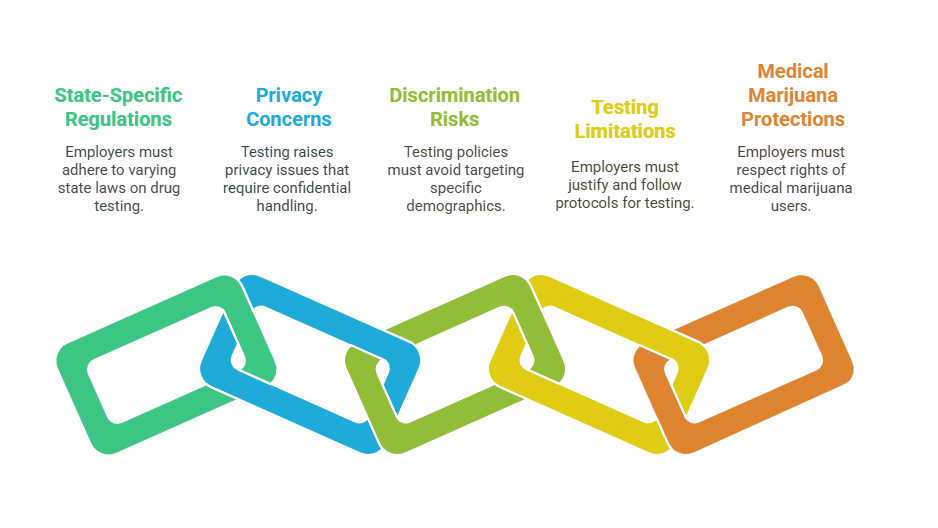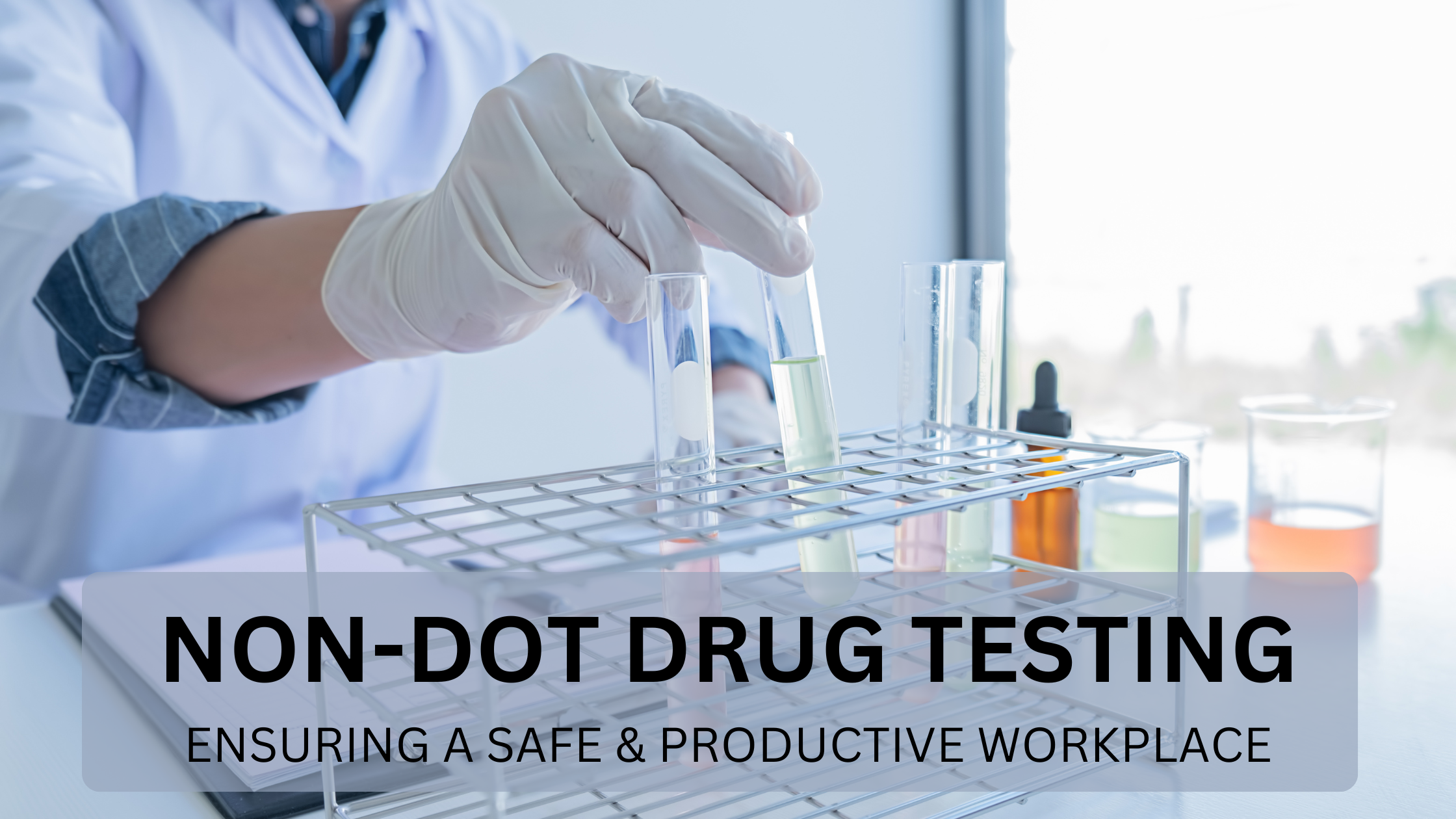Introduction to Non-DOT Drug Testing and Its Importance
Drug testing plays a critical role in maintaining a safe, productive, and compliant workplace. Employers often rely on drug tests to ensure that employees are fit for duty and not impaired by substances while on the job. While many are familiar with the regulations surrounding Department of Transportation (DOT) drug testing, Non-DOT drug testing operates in a different capacity.
Non-DOT drug testing refers to drug tests conducted by employers outside the federal DOT framework. Unlike DOT testing, which is required for safety-sensitive positions (like truck drivers, pilots, and train operators), Non-DOT drug testing is implemented at the discretion of employers across a wide range of industries.
Why is Non-DOT Drug Testing Important?
-
Ensuring Workplace Safety The primary benefit of Non-DOT drug testing is the promotion of a safe workplace. In industries where machinery operation, manual labor, or attention to detail is required, substance abuse can lead to accidents or injuries. Drug testing helps reduce the risk of impaired workers causing harm to themselves or others.
-
Enhancing Productivity Substance abuse often leads to decreased productivity, absenteeism, and poor job performance. Employers who conduct drug tests can identify issues early and take steps to address them, whether through counseling, rehabilitation programs, or other forms of support. This proactive approach can improve employee performance and overall productivity.
-
Legal Compliance and Risk Management Even though Non-DOT drug testing is not federally mandated, certain state or local laws may require employers to implement drug testing policies. Additionally, some businesses may choose to implement drug testing to manage legal risks and adhere to industry-specific regulations.
-
Protecting Company Reputation A company’s reputation can be bolstered by demonstrating a commitment to a drug-free workplace. By promoting employee safety and well-being, businesses can build a positive image among clients, customers, and potential business partners.
What is Non-DOT Drug Testing?
Non-DOT drug testing refers to drug testing procedures for employees who are not in safety-sensitive positions regulated by the Department of Transportation (DOT). Unlike DOT drug testing, which is mandatory for certain transportation roles, Non-DOT testing is voluntary and can be customized by employers across various industries. This flexibility makes it a common choice for businesses looking to promote a safe and drug-free workplace.
Types of Non-DOT Drug Testing
Non-DOT drug testing comes in several types, depending on the employer’s needs and the industry they are in. Each test type serves a different purpose, ensuring that drug use is prevented or addressed in different situations.

-
Pre-Employment Testing
This test is performed before hiring a new employee to ensure that they are not under the influence of drugs before beginning their work. It is one of the most common forms of Non-DOT drug testing, helping employers screen out candidates who might be a risk to the workplace. -
Random Testing
Random drug testing is done without any prior notice, ensuring that employees do not rely on the timing of testing to avoid detection. It serves as a deterrent to potential drug use among employees, helping to maintain a drug-free workplace at all times. -
Reasonable Suspicion Testing
When an employer suspects that an employee is under the influence due to observable behaviors or other signs, reasonable suspicion testing is performed. This type of testing can happen at any time during the employee’s shift. -
Post-Accident Testing
Post-accident drug testing is required when an employee is involved in a workplace incident or accident. This test helps determine whether drugs or alcohol played a role in the event and ensures that safety protocols are followed. -
Return-to-Duty Testing
This test is conducted after an employee has been found to be in violation of the company’s drug policy (e.g., tested positive) and is returning to work after completing a rehabilitation program. It ensures that the employee is no longer impaired and is fit to resume work. -
Follow-Up Testing
After an employee has successfully returned to work, follow-up testing ensures that they continue to stay drug-free. These tests are typically scheduled at random intervals over a period of time after the employee has returned.
Non-DOT Drug Testing Panel: What Is Tested?
Employers have the flexibility to choose the substances tested in Non-DOT drug screenings. Common substances tested include:
-
Marijuana (THC)
-
Cocaine
-
Opiates
-
Amphetamines
-
Phencyclidine (PCP)
-
MDMA (Ecstasy)
Some employers may opt for additional substances based on industry requirements or company policies. Below is a general outline of common substances tested for:
| Substance | Commonly Tested For | Potential Effects on Employees |
|---|---|---|
| Marijuana (THC) | Marijuana use is widely tested for, especially in states where it remains illegal | Impaired focus, coordination, and judgment |
| Cocaine | Cocaine is tested due to its impact on alertness and behavior | Increased risk of accidents and erratic behavior |
| Opiates | Includes prescription painkillers and illegal substances like heroin | Drowsiness, lack of coordination, and dizziness |
| Amphetamines | Often tested due to their stimulant effects | Restlessness, increased risk-taking behavior, and impaired decision-making |
| Phencyclidine (PCP) | A powerful hallucinogenic drug | Aggression, confusion, and impaired judgment |
| MDMA (Ecstasy) | Tested for due to its stimulant and hallucinogenic properties | Increased heart rate, confusion, and erratic behavior |
Who Should Conduct Non-DOT Drug Testing?
Non-DOT drug testing can be performed by third-party providers who specialize in drug screening or by companies with internal capabilities. Most employers prefer working with third-party service providers to ensure the testing is done according to industry standards, using certified laboratories for sample analysis.
Employers can also use rapid drug test kits for on-site testing. These kits offer a quick and convenient way to screen employees, but confirmatory testing at a certified laboratory is generally recommended to ensure accuracy.
Benefits of Non-DOT Drug Testing
-
Customizable Testing Policies
Non-DOT drug testing allows employers to create drug testing programs that fit their business needs. Employers can select which substances to test for, how frequently tests will be conducted, and what type of testing methods to use, providing flexibility and tailored policies. -
Cost-Effectiveness
Non-DOT testing is generally more affordable than DOT testing, as it does not require adherence to the same strict regulatory standards. Employers can reduce administrative and compliance costs while still maintaining a safe and drug-free workplace. -
Increased Workplace Safety
By conducting Non-DOT drug testing, employers reduce the likelihood of employees being impaired while on the job. This enhances safety, particularly in industries where the use of machinery, vehicles, or high-risk tasks is involved. -
Support for Employee Health
Many companies also use Non-DOT drug testing as part of a broader wellness program. Identifying substance abuse problems allows companies to direct employees to appropriate resources such as counseling or rehabilitation services. -
Legal and Liability Protection
Implementing Non-DOT drug testing can also protect employers from potential legal issues. By taking proactive measures to ensure a drug-free workplace, businesses can avoid costly lawsuits, workplace accidents, and liability concerns.
Legal Considerations in Non-DOT Drug Testing
While Non-DOT drug testing is not subject to the same regulations as DOT testing, it is still critical for employers to understand the legal landscape. Employers who choose to implement Non-DOT drug testing must ensure that they comply with both federal and state laws to avoid potential legal challenges.

-
State-Specific Regulations
Different states have varying laws regarding drug testing in the workplace. Some states, like California and Colorado, have specific rules governing the testing of marijuana, particularly in light of its legalization for recreational or medicinal use. Employers must stay informed about state laws to avoid infringing on employee rights. -
Privacy Concerns
Non-DOT drug testing may raise privacy issues, as it involves testing employees for substances that may not be relevant to their job performance. Employers should have clear policies in place outlining when testing will occur and the procedures that will be followed. Additionally, it’s important for companies to handle test results with confidentiality to protect employees’ privacy. -
Discrimination Risks
Employers must be cautious about how they administer drug testing policies. In some cases, overly broad or discriminatory policies could lead to legal action, particularly if certain groups are disproportionately targeted for testing. For example, a policy that unfairly singles out certain demographics for drug testing might be viewed as discriminatory. -
Reasonable Suspicion and Testing Limitations
While reasonable suspicion drug testing is common, employers must be able to demonstrate that the suspicion is legitimate. Random and post-accident testing must also be conducted according to company policies and guidelines. Unjustified testing or failure to follow proper protocols could expose employers to legal risks. -
Medical Marijuana and Disability Protections
Employers must also be aware of protections for employees who use medical marijuana, particularly in states where it is legal. Employers may not be able to terminate employees solely for testing positive for medical marijuana unless the employee’s use impairs their ability to perform their duties safely. Employers must balance their desire to maintain a drug-free workplace with the rights of employees using medical marijuana for legitimate reasons.
Frequently Asked Questions (FAQs)
Is Non-DOT drug testing mandatory for all employers?
No, Non-DOT drug testing is not mandatory. It is a voluntary practice that employers can choose to implement based on the nature of their business and the industry they operate in.
Can an employer test for substances other than drugs?
Yes, employers can include alcohol testing and other substances such as synthetic drugs or specific prescription medications, depending on the nature of their business and testing policies.
How often can employers conduct random drug testing?
Random drug testing can be conducted at any time without prior notice. The frequency depends on the employer's policy but is typically conducted on a random basis throughout the year.
What should an employer do if an employee refuses a drug test?
If an employee refuses a drug test, employers should refer to their company’s policy. In many cases, refusal may result in disciplinary action, up to and including termination, depending on the severity of the situation and company regulations.
Can Non-DOT drug testing be used for employees who drive company vehicles?
Yes, employers can include Non-DOT drug testing for employees who operate company vehicles, even though these employees may not fall under the DOT’s regulations. It’s important to have clear policies that define testing requirements for these positions.
Conclusion
Non-DOT drug testing provides employers with the flexibility to maintain a safe and productive workplace. It allows businesses to screen for drug use in a way that is tailored to their specific needs, promoting safety, legal compliance, and employee well-being. While it is not federally mandated, it offers significant benefits, including increased safety, improved productivity, and better management of risks.
However, employers must be diligent in following legal guidelines and understanding state-specific regulations. Crafting a clear, consistent, and legally sound drug testing policy is crucial to ensuring that the testing process runs smoothly and fairly for all employees.
If you’re looking for professional assistance with Non-DOT drug testing programs, RapidHireSolutions can help. We offer comprehensive drug testing services that can be customized to meet your company’s needs, ensuring a safe and compliant workplace.

